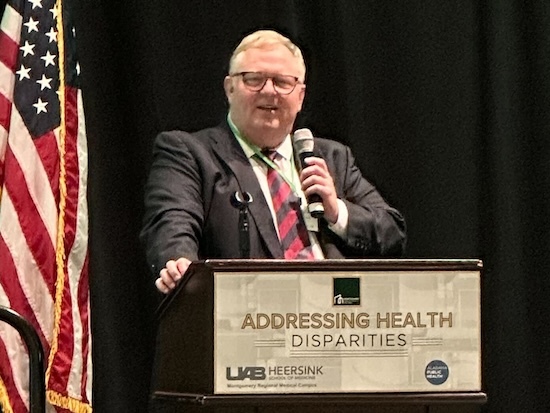The second annual Montgomery Health Policy Meeting was held on Thursday, April 4, 2024. Sponsored by UAB Heersink School of Medicine Montgomery Regional Medical Campus and the Kennamer family, the event aims to bring together prominent members of government, public health and policy, and medicine to highlight urgent issues affecting the people of Alabama.
This year’s speakers included:
-
Jon D. Simmons, M.D., FACS, trauma/emergency general surgeon, trauma medical director, chief of Trauma and Acute Care Surgery, professor of Surgery, University of South Alabama
-
John Vermillion, M.D., director of Trauma, Baptist South Surgery, Baptist Health
-
Daniel Carrion, Ph.D., MPH, assistant professor of Epidemiology (Environmental Health); director of Education, Climate Change and Health, Yale School of Public Health
-
Thomas Dobbs, M.D., dean, John D. Bower School of Population Health, Mississippi Department of Health
-
Mona Fouad, M.D., MPH, associate vice president for Diversity, Equity, and Inclusion at UAB, senior associate dean for Diversity and Inclusion at UAB Heersink School of Medicine, and professor in the Division of Preventive Medicine, Edward E. Partridge, M.D., Endowed Chair for Cancer Disparity Research, director of the UAB Minority Health and Health Equity Research Center
Key Takeaways
The conference commenced with Chip Hill, chief of staff for the Montgomery mayor, extending a cordial welcome to Montgomery, emphasizing the city's transformation into the "new Montgomery." He highlighted the city's endeavors to become a pivotal solution center for various societal challenges, particularly emphasizing the crucial role of healthcare.
Heersink School of Medicine Dean Anupam Agarwal, M.D., subsequently initiated the proceedings with opening remarks, setting the stage for a series of discussions on healthcare disparities and environmental justice.
Disparities in Trauma Incidence and Care
Louis Lambiase, M.D., MHA, regional dean of the Montgomery Regional Medical Campus and professor of Medicine, led an open discussion with Simmons and Vermillion. They delved into the disparities in trauma incidence and care, shedding light on Alabama's pioneering efforts in developing a sophisticated pre-hospital trauma system, albeit facing challenges in funding and resource allocation.
Lambiase underscored the urgency of swift access to trauma care, stressing its potential to save lives and enhance the quality of life for patients. Moreover, he elucidated the financial and personal commitments involved in trauma care, signaling a need for systemic reforms.
Environmental, Climate and Health Justice: Exploring the Impact of Place-Based Inequities
Carrion expounded on environmental and health justice, emphasizing the intersectionality of poverty, race, and environmental conditions, particularly within the context of climate change. “Climate change is the greatest threat facing the 21st century,” he claimed. Referencing the “heat or eat” dilemma and the lesser known “heat stroke or go broke” dilemma, Carrion advocated for equitable access to healthcare and addressing disparities exacerbated by climate change.
Drivers of Health Inequities
Dobbs elucidated the multifaceted drivers of health inequities. “Clinical health care only accounts for 20 percent of our well-being. 40 percent accounts for social and economic factors. Health care does not equal health,” he stated. While emphasizing the importance of holistic health care approaches that consider social determinants such as financial and food insecurities, Dobbs used the education on the health risks of smoking as an example of the good work that has been done but reminded attendees that providers must be part of the conversations beyond the diagnosis.
Building Community Capacity: A Path for Health Equity
Fouad wrapped up the day with the Kennamer Distinguished Lecturer, highlighting the significance of community-based approaches in advancing health equity, stressing the need for collaborative efforts that empower communities and prioritize their needs. Through these discussions, it became evident that tackling healthcare disparities requires comprehensive strategies that encompass systemic reforms, community empowerment, and environmental justice initiatives. To learn more, visit Minority Health Equity Research Center.
Save the date for the next Montgomery Health Policy Meeting, scheduled for April 10, 2025.